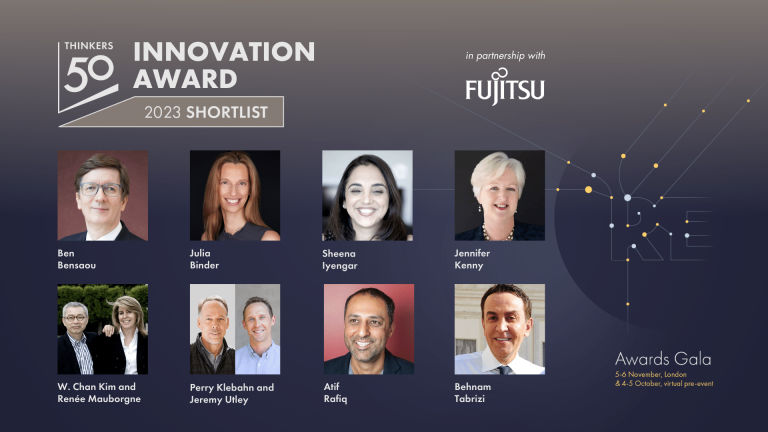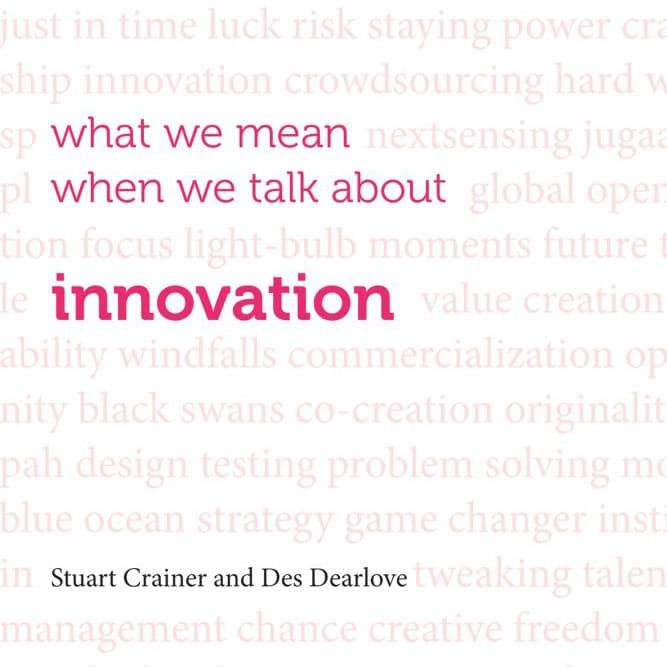

“Ideas are the root of creation,” noted the French writer Ernest Dimnet. Ideas are the lifeblood of innovation. They are important because they have the power to change the world. Think of Copernicus, Socrates, Aristotle, Newton, Galileo, or Einstein. Think of Charles Darwin, the ultimate disruptive innovator.
Ideas define our humanity. They shape the way we think and see our place in the universe. “There is no prosperity, trade, art, city, or great material wealth of any kind, but if you trace it home, you will find it rooted in a thought of some individual man,” wrote Ralph Waldo Emerson.
Equally, in the business world, too, ideas matter — from Steve Jobs to Tim Berners-Lee; and Google to Uber — new thinkers and new ideas challenge and redefine how we work and live. An idea can change an entire industry and ideas, from kaizen to the balanced scorecard, continually transform the way we work and lead our businesses.
Notions such as empowerment, championed in the 1980s, and emotional intelligence in the 1990s seem self-evident now. But we have come a long way from Scientific Management and using a stopwatch to manage performance. Ideas like Howard Gardner’s Multiple Intelligence Theory laid the foundations for that.
Or consider the influence of Clayton Christensen, who topped the Thinkers50 ranking in 2011 and 2013. Christensen’s influence on the business world has been profound. In The Innovator’s Dilemma, he looked at why companies struggle to deal with radical innovation in their markets. The book introduced the idea of disruptive technologies and disruptive innovation to a generation of managers.
Some ideas make us reappraise what we thought we already knew. Until very recently, for example, most managers were (and many still are) convinced that fear and greed were the two primary levers for motivating people. But Dan Pink’s book, Drive: The Surprising Truth About What Motivates Us tackles the perennial subject of motivation, and argues that we need to abandon the ineffectual carrot and stick approach, and the importance of doing something we love for a career.
Gary Hamel, co-author of Competing for the Future and other business bestsellers provides an interesting perspective: “I think we can think almost of a hierarchy of innovation, if you will. At the bottom is operational innovation—the things that organizations do every day to get incrementally more efficient and more productive; a lot of stuff goes on around IT, customer support, and so on. A level up from that, you have product innovation of the sort that delivers the latest flat-screen television or some new financial instrument. Above that, you have business model innovation, which created Facebook, IKEA, Southwest Airlines—pick your example.
“But really at the top you have management innovation—fundamental breakthroughs in the way we organize human beings in productive ways. And if you go back over the last 100 or so years of industrial history, what you’ll find is that the most significant and enduring shifts in competitive advantage came not from innovation in products, technology, or business models, but from innovation in management itself.
“So, management innovation is anything that changes the way the work of management gets done (how we allocate, plan, direct, and so on) or changes who does that work. And in an organization of any size, the only way you change the work of management is by changing the processes, the routines that govern the way that work gets done: how you submit a budget requisition, how you evaluate an employee, and so on. So, management innovation is really focused on those core management processes that drive the organization forward.”
Management ideas can be the catalyst for a better future. Management thinking isn’t just relevant to business – it can change the wider world. From building the pyramids to putting a man on the moon, management has always been at the heart of human endeavor. Today, the very best management thinking can address many of the challenges facing the world – from reducing world poverty and crime, to creating more effective healthcare and building a sustainable model of capitalism.
In recent years, for instance, Clay Christensen has applied his ideas to healthcare and education — showing how enlightened management thinking can tackle the big issues facing society.
The INSEAD professors Chan W. Kim and Renée Mauborgne, Korean and American, respectively, are the authors of Blue Ocean Strategy which has sold over two million copies. Their ideas have been embraced by companies, not-for-profits and national governments around the world. The government of Malaysia has a National Blue Ocean Strategy. A key target is building rural infrastructure – providing housing and water supplies for the rural poor. The Malaysian Prime Minister has said publicly that the blue ocean concept has already proved useful in several government programs.
Interestingly, Renee Mauborgne suggests that in many ways we have defined innovation too narrowly. “Fundamentally, innovation occurs across industries, across countries, across companies. These are universal forces. It is, therefore, irrelevant to categorize organizations by their sector or geographical location. Yet, if you look at strategy literature, industry boundaries are usually regarded as central—think of SWOT analysis or Michael Porter’s Five Forces Framework,” she says.
Ideas change the world. The reaction to Steve Jobs’ untimely death reminds us of that. Jobs changed how we live our lives with his ideas and products. So too did the late CK Prahalad with his idea of the Fortune at the Bottom of the Pyramid – which challenged businesses to look for commercial solutions to the problems facing the poorest people on the planet.
Elsewhere, a blog by Vijay Govindarajan and Christian Sarkar challenged designers to create a house for $300 and set off a campaign to re-invent housing for the world’s poorest people.
New ideas and new approaches are vital to fuel growth and progress. Ideas are not just a luxury for good times; they are even more crucial in challenging times. Fresh thinking is the best antidote for recession — not cutting jobs. What organizations need right now is innovation and new ways of organizing themselves. Ideas are the route to a brighter future.
Resources
Dan Pink, Drive: The Surprising Truth About What Motivates Us, Riverhead, 2009
W Chan Kim and Renée Mauborgne, Blue Ocean Strategy (Expanded edition), Harvard Business Review Press, 2015
Clay Christensen, The Innovator’s Dilemma, Harvard Business Review Press, 2013
Clay Christensen, The Innovator’s Solution (with Michael Raynor), Harvard Business Review Press, 2013
Clay Christensen, Karen Dillon and James Allworth, How Will You Measure Your Life, Harvard Business Review Press, 2012
This was originally published in What we mean when we talk about innovation by Stuart Crainer and Des Dearlove (Infinite Ideas, 2016).

Thinkers50 Limited
The Studio
Highfield Lane
Wargrave RG10 8PZ
United Kingdom

Thinkers50 Limited
The Studio
Highfield Lane
Wargrave RG10 8PZ
United Kingdom

| Cookie | Duration | Description |
|---|---|---|
| LANG | 9 hours | Linkedin set this cookie to set user's preferred language. |
| nsid | session | This cookie is set by the provider PayPal to enable the PayPal payment service in the website. |
| sp_landing | 1 day | The sp_landing is set by Spotify to implement audio content from Spotify on the website and also registers information on user interaction related to the audio content. |
| sp_t | 1 year | The sp_t cookie is set by Spotify to implement audio content from Spotify on the website and also registers information on user interaction related to the audio content. |
| tsrce | 3 days | PayPal sets this cookie to enable the PayPal payment service in the website. |
| x-pp-s | session | PayPal sets this cookie to process payments on the site. |
| __cf_bm | 30 minutes | This cookie, set by Cloudflare, is used to support Cloudflare Bot Management. |
| Cookie | Duration | Description |
|---|---|---|
| l7_az | 30 minutes | This cookie is necessary for the PayPal login-function on the website. |
| Cookie | Duration | Description |
|---|---|---|
| CONSENT | 2 years | YouTube sets this cookie via embedded youtube-videos and registers anonymous statistical data. |
| _ga | 2 years | The _ga cookie, installed by Google Analytics, calculates visitor, session and campaign data and also keeps track of site usage for the site's analytics report. The cookie stores information anonymously and assigns a randomly generated number to recognize unique visitors. |
| _gat_gtag_UA_10408481_1 | 1 minute | Set by Google to distinguish users. |
| _ga_ZP8HQ8RZXS | 2 years | This cookie is installed by Google Analytics. |
| _gid | 1 day | Installed by Google Analytics, _gid cookie stores information on how visitors use a website, while also creating an analytics report of the website's performance. Some of the data that are collected include the number of visitors, their source, and the pages they visit anonymously. |
| Cookie | Duration | Description |
|---|---|---|
| NID | 6 months | NID cookie, set by Google, is used for advertising purposes; to limit the number of times the user sees an ad, to mute unwanted ads, and to measure the effectiveness of ads. |
| test_cookie | 15 minutes | The test_cookie is set by doubleclick.net and is used to determine if the user's browser supports cookies. |
| VISITOR_INFO1_LIVE | 5 months 27 days | A cookie set by YouTube to measure bandwidth that determines whether the user gets the new or old player interface. |
| YSC | session | YSC cookie is set by Youtube and is used to track the views of embedded videos on Youtube pages. |
| yt-remote-connected-devices | never | YouTube sets this cookie to store the video preferences of the user using embedded YouTube video. |
| yt-remote-device-id | never | YouTube sets this cookie to store the video preferences of the user using embedded YouTube video. |
| yt.innertube::nextId | never | This cookie, set by YouTube, registers a unique ID to store data on what videos from YouTube the user has seen. |
| yt.innertube::requests | never | This cookie, set by YouTube, registers a unique ID to store data on what videos from YouTube the user has seen. |
| Cookie | Duration | Description |
|---|---|---|
| DEVICE_INFO | 5 months 27 days | No description |
| loglevel | never | No description available. |
| m | 2 years | No description available. |
Thinkers50 Limited has updated its Privacy Policy on 28 March 2024 with several amendments and additions to the previous version, to fully incorporate to the text information required by current applicable date protection regulation. Processing of the personal data of Thinkers50’s customers, potential customers and other stakeholders has not been changed essentially, but the texts have been clarified and amended to give more detailed information of the processing activities.